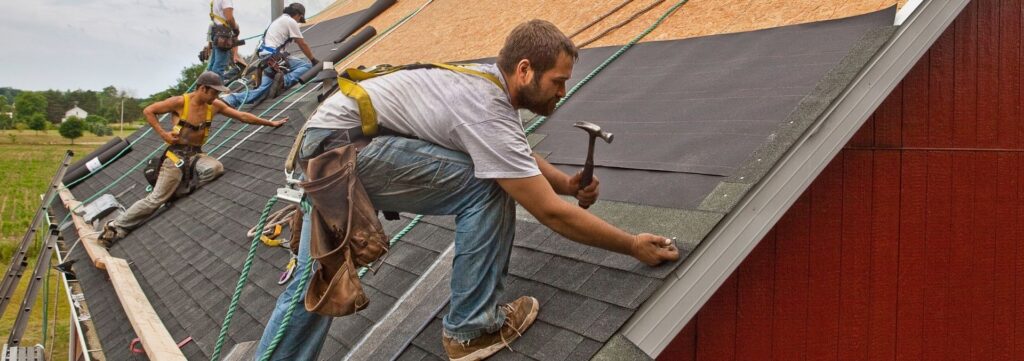Roofing Warranties: What You Need to Know
Replacement roofs are a costly, but often critical investment to maintain your property’s value. In some areas of the country, the purchase can set you back more than $25,000. For example, the average cost for a roof replacement in Spokane, WA, is $27,273. Thinking about metal roofing? That’s more than $45,000 in Spokane. That’s why you need to consider the warranty that comes with your investment—and the people installing it. A roof guaranteed for a lifetime from a company that’s only been in business for a year might sound a little suspect—and it should. You want to work with a reputable contractor that provides quality products and warranties backed up by them and the manufacturer.
There are three types of roofing warranties: a standard warranty offered by manufacturer of the roofing materials, a workmanship warranty offered by the contractor, and an extended manufacturers’ warranty that covers contractor workmanship and expanded coverage for the products.
Standard Manufacturers’ Warranties
- Length of Coverage Time: For asphalt roofing, you can find warranties that range from 10–30 years, but some manufacturers offer 50-year and “lifetime” coverage which generally means for as long as you own your home. Which manufacturer you choose matters a lot. Not all products and roofing systems are created equal. Be sure to ask your contractor about the products they install and how long they and the manufacturer will guarantee the roof.
- Prorated Reimbursement: Even manufacturers who offer lifetime warranties use a prorated system. This means that they may cover the full cost of replacement of defective shingles in the first few years, but as time passes, your warranty will be prorated. So, if you file a claim after only 2 years, you will get more coverage than if you file a claim after 15 years.
- Coverage for Materials Only: Many manufacturer warranties only provide coverage for factory defects of roofing shingles. They will not cover materials that prematurely fail because mistakes were made during installation. They also do not cover labor to make the repairs or for disposal of old materials. To receive those benefits, you may need to purchase an extended warranty that covers both materials and workmanship.
Contractor Workmanship Warranties
Workmanship warranties protect you against material failures due to worker errors or poor installation. They cover labor costs, materials, and may even cover damage to your home and furnishings caused by negligence. But they would not protect you against damage caused by forces of nature like storms, wind, falling trees, and ice dams.
The workmanship warranty comes directly from your roofing contractor. It may be for a shorter time period, but some companies offer lifetime warranties supported by manufacturers. Contractor warranties can vary from one company to the next, so review them closely to see who offers the best deal. Here is what you can do to help protect yourself:
- Ask for a clear explanation in writing as to what is covered and what is not. Some will cover related damage to your home’s interior as well as furniture and personal items.
- Read all the fine print and create a spreadsheet or table measuring one company against another.
- Determine if each warranty covers just workmanship or if they cover materials as well.
- Before signing a contract, make sure you know how long the company has been in business. Ask for and check references, and never pay the full quote upfront. You will typically be required to pay a deposit before work begins and then the balance once the job has been completed to your satisfaction.
Extended Manufacturer Warranties
- Manufacturers also offer extended warranties for an additional cost. Most require that you have a complete roof system installed to include ice and water barriers, underlayment, hp and ridge cap shingles, soffit and ridge vents, and starter and field shingles.
- The warranty should include non-prorated coverage for defective materials, labor costs for repairs or replacements, and workmanship coverage against installation errors.
- For extended warranties, the contractor must be officially approved by the manufacturer to install the roof and provide the warranty. In this case the contractor must register the warranty on your behalf.
How to Protect Your Warranty
- Get Regular Roof Inspections: Have your roof inspected every two years and address minor issues so they don’t require major repairs.
- Don’t Change Contractors: Your contractor’s warranty coverage may be voided if you hire someone else to make repairs. The contractor views this as changing the original installation and will not be held responsible.
- Register Your Warranty: Be sure to register your warranty with the manufacturer. If you don’t, they may have grounds to void the warranty.
Looking to replace your roof? NOW Remodeling in Boise, Spokane, and Richland is a Preferred Contractor of Owens Corning roofing systems which means we meet their high standards for installer training, insurance, and licensing. Because we employ the entire six-step system, using all Owens Corning products and installing them to the exact manufacturer specifications, we provide you with a double lifetime warranty that covers products and labor. We don’t take shortcuts, and neither should you. Do your research request your free quote today.

